- Home
- Philip Roth
The Counterlife Page 2
The Counterlife Read online
Page 2
The cardiologist gave him a serious talking-to the next time Henry came for a checkup. He reminded him that since he’d been on the medication his EKG had shown a marked diminution of the abnormality that had first signaled his trouble. His blood pressure was safely under control, and unlike some of the cardiologist’s patients, who couldn’t brush their teeth without the effort causing severe angina, he was able to work all day standing on his feet without discomfort or shortness of breath. He was again reassured that if there was any deterioration in his condition, it would almost certainly occur gradually and show up first on the EKG or with a change of symptoms. Were that to happen, they would then reevaluate the surgical option. The cardiologist reminded him that he could continue safely along on this regimen for as long as fifteen or twenty years, by which time the bypass operation would more than likely be an outmoded technique; he predicted that by the 1990s they would almost certainly be correcting arterial blockage by other than surgical means. The beta-blocker might itself soon come to be replaced by a drug that did not affect the central nervous system and cause this unfortunate consequence—that sort of progress was inevitable. In the meantime, as he’d advised him already and could only repeat, Henry must simply forget his heart and go out and live. “You must see the medication in context,” the cardiologist said, lightly striking his desk.
And was that the last there was to say? Was he now expected to get up and go home? Dully Henry told him, “But I can’t accept the sexual blow.” The cardiologist’s wife was someone Carol knew and so of course he couldn’t explain about Maria or Wendy or the two women in between, and what each of them had meant to him. Henry said, “This is the most difficult thing I’ve ever had to face.”
“You haven’t had a very difficult life then, have you?”
He was stunned by the cruelty of the reply—to say such a thing to a man as vulnerable as himself! Now he hated the doctor too.
That night, from his study, he again phoned Nathan, his last remaining consolation, and this time found him home. He was barely able to prevent himself from dissolving in tears when he told his brother that he was seriously ill and asked if he could come to see him. It was impossible living alone any longer with his staggering loss.
* * *
Needless to say, these were not the three thousand words that Carol had been expecting when she’d phoned the evening before the funeral and, despite all that had driven the two brothers apart, asked if Zuckerman would deliver a eulogy. Nor was the writer ignorant of what was seemly, or indifferent to the conventions that ruled these occasions; nonetheless, once he’d started there was no stopping, and he was at his desk most of the night piecing Henry’s story together from the little he knew.
When he got over to Jersey the next morning, he told Carol more or less the truth about what had happened. “I’m sorry if you were counting on me,” he said, “but everything I put down was wrong. It just didn’t work.” He supposed that she would now suppose that if a professional writer finds himself stymied by what to say at his own brother’s funeral, it’s either hopelessly mixed emotions or an old-fashioned bad conscience that’s doing it. Well, less harm in what Carol happened to think of him than in delivering to the assembled mourners this grossly inappropriate text.
All Carol said was what she usually said: she understood; she even kissed him, she who had never been his greatest fan. “It’s all right. Please don’t worry. We just didn’t want to leave you out. The quarrels no longer matter. That’s all over. What matters today is that you were brothers.”
Fine, fine. But what about the three thousand words? The trouble was that words that were morally inappropriate for a funeral were just the sort of words that engaged him. Henry wasn’t dead twenty-four hours when the narrative began to burn a hole in Zuckerman’s pocket. He was now going to have a very hard time getting through the day without seeing everything that happened as more, a continuation not of life but of his work or work-to-be. Already, by failing to use his head and discreetly cobbling together some childhood memories with a few conventionally consoling sentiments, he’d made it impossible for himself to take his place with everyone else, a decent man of mature years mourning a brother who’d died before his time—instead he was again the family outsider. Entering the synagogue with Carol and the kids, he thought, “This profession even fucks up grief.”
Though the synagogue was large, every seat was occupied, and clustered at the rear and along the side aisles were some twenty or thirty adolescents, local youngsters whose teeth Henry had been taking care of since they were children. The boys looked stoically at the floor and some of the girls were already crying. A few rows from the back, unobtrusive in a gray sweater and skirt, sat a slight, girlishly young blonde whom Zuckerman wouldn’t even have noticed if he hadn’t been looking for her—whom he wouldn’t have been able to recognize if not for the photograph that Henry had brought along on his second visit. “The picture,” Henry warned, “doesn’t do her justice.” Zuckerman was admiring nonetheless: “Very pretty. You make me envious.” A little immodest little-brother smirk of self-admiration could not be entirely suppressed, even as Henry replied, “No, no, she doesn’t photograph well. You can’t really see from this what it is she has.” “Oh yes I can,” said Nathan, who was and wasn’t surprised by Wendy’s plainness. Maria, if not as astonishingly beautiful in her picture as she’d first been described by Henry, had been attractive enough in a sternly Teutonic, symmetrical way. However, this bland little twat—why, Carol with her curly black hair and long dark lashes looked erotically more promising. It was, of course, with Wendy’s picture still in his hand that Zuckerman should have laid into Henry with all he had—that might even have been why Henry had brought the picture, to give him the opening, to hear Nathan tell him, “Idiot! Ass! Absolutely not! If you wouldn’t leave Carol to run off with Maria, a woman whom you actually loved, you are not going into the hospital for dangerous surgery just because some broad at the office blows you every night before you go home for dinner! I have heard your case for that operation and up till now haven’t said a word—but my verdict, which is law, is no!”
But inasmuch as Henry wasn’t dead then but alive—alive and outraged that a man with his moral credentials should be thwarted in this single, small, harmless transgression—inasmuch as he had already accepted the compromise of Wendy when what he had dreamed of and denied himself was to be remade in Europe with a European wife, to become in Basel an unfettered, robust, fully grown-up American expatriate dentist, Zuckerman had found his thoughts moving more along these lines: “This is his rebellion against the deal he’s made, the outlet for what’s survived of brutish passion. He surely hasn’t come to me to be told that life obstructs and life denies and there’s nothing to do but accept it. He’s here to argue it out in my presence because my strong point isn’t supposed to be a talent for self-denial—I, in their lore, am the reckless, freewheeling impulsive, to me they’ve assigned the role of family id, and he is the exemplary brother. No, a certified irresponsible spirit can’t now come on in fatherly tones, gently telling him, ‘You don’t need what you want, my boy—relinquish your Wendy and you’ll suffer less.’ No, Wendy is his freedom and his manhood, even if she happens to look to me a little like boredom incarnate. She’s a nice kid with an oral hang-up who he’s pretty sure will never phone the house—so why shouldn’t he have her? The more I look at this picture, the more I understand his point. How much is the poor guy asking for?”
But you reason differently so close to the coffin of your only brother that you can practically rest your cheek on the shining mahogany wood. When Nathan made the inevitable effort to imagine Henry laid out inside, he did not see, silenced, the unmanned, overheated adulterer who had refused to be resigned to losing his potency—he saw the boy of ten, lying there wearing flannel pajamas. One Halloween when they were children, hours after Nathan had brought Henry home from trick-or-treating in the neighborhood, after the whole family had long been in bed, Henry
had wandered out of his room, down the stairs, out the door, and into the street, heading for the intersection at Chancellor Avenue without even his slippers on and still in his sleep. Miraculously, a friend of the family who lived over in Hillside happened to be driving by their corner as Henry was about to step off the curb against the light. He pulled over, recognized the child under the street lamp as Victor Zuckerman’s little son, and Henry was safely home and back beneath the covers only minutes later. It was thrilling for him to learn the next morning of what he’d done while still fast asleep and to hear of the bizarre coincidence that had led to his rescue; until adolescence, when he began to develop more spectacular ideas of personal heroism as a hurdler for the high-school track team, he must have repeated to a hundred people the story of the daring midnight excursion to which he himself had been completely tuned out.
But now he was in his coffin, the sleepwalking boy. This time nobody had taken him home and tucked him back into bed when he went wandering off alone in the dark, unable to forswear his Halloween kicks. Equally possessed, in a Herculean trance, carried along by an exciting infusion of Wild West bravado—that’s how he’d struck Nathan on the afternoon he arrived at his apartment fresh from a consultation with the cardiac surgeon. Zuckerman was surprised: it wasn’t the way he would have imagined walking out of one of those guys’ offices after he’d told you his plans for carving you up.
Henry unfolded on Nathan’s desk what looked like the design for a big cloverleaf highway. It was the sketch that the surgeon had made to show him where the grafts would go. The operation sounded, as Henry described it, no trickier than a root-canal job. He replaces this one and this one and hooks them up here, bypasses three tiny ones feeding into the one back there—and that’s the whole shmeer. The surgeon, a leading Manhattan specialist whose qualifications Zuckerman had double-checked, told Henry that he had been through quintuple bypass surgery dozens of times and wasn’t worried about holding up his end; it was Henry who now had to squelch all his doubts and approach the operation with every confidence that it was going to be a hundred percent success. He would emerge from the surgery with a brand-new system of unclogged vessels supplying blood to a heart that was itself as strong still as an athlete’s and completely unimpaired. “And no medication afterwards?” Henry asked him. “Up to your cardiologist,” he was told; “probably something for a little mild hypertension, but nothing like the knockout drops you’re on now.” Zuckerman wondered if, upon hearing the marvelous prognosis, Henry’s euphoria had prompted him to present the cardiac surgeon with a personally signed 8½ × 11 glossy of Wendy in her garter belt. He seemed loopy enough for it when he arrived, but probably that was how you had to be to steel yourself for such a frightening ordeal. When Henry had finally mustered the courage to stop asking for reassurance and get up and go, the confident surgeon had accompanied him to the door. “If the two of us are working together,” he told him, shaking Henry by the hand, “I can’t foresee any problems. In a week, ten days, you’ll be out of the hospital and back with your family, a new man.”
Well, from where Zuckerman was sitting it looked as though on the operating table Henry hadn’t been pulling his weight. Whatever he was supposed to do to assist the surgeon had apparently slipped his mind. This can happen when you’re unconscious. My sleepwalking brother! Dead! Is that you in there, really, an obedient and proper little boy like you? All for twenty minutes with Wendy before hurrying home to the household you loved? Or were you showing off for me? It cannot be that your refusal to make do with a desexed life was what you thought of as your heroism—because if anything it was your repression that was your claim to fame. I mean this. Contrary to what you thought, I was never so disdainful of the restrictions under which you flourished and the boundaries you observed as you were of the excessive liberties you imagined me taking. You confided in me because you believed I would understand Wendy’s mouth—and you were right. It went way beyond the juicy pleasure. It was your drop of theatrical existence, your disorder, your escapade, your risk, your little daily insurrection against all your overwhelming virtues—debauching Wendy for twenty minutes a day, then home at night for the temporal satisfactions of ordinary family life. Slavish Wendy’s mouth was your taste of reckless fun. Old as the hills, the whole world operates this way … and yet there must be more, there has to be more! How could a genuinely good kid like you, with your ferocious sense of correctness, wind up in this box for the sake of that mouth? And why didn’t I stop you?
Zuckerman had taken a seat in the first row, on the aisle, next to Bill and Bea Goff, Carol’s parents. Carol sat at the center of the row, beside her mother; on her other side she had placed the children—her eleven-year-old daughter, Ellen, her fourteen-year-old son, Leslie, and nearest the far aisle, Ruth, the thirteen-year-old. Ruth was holding her violin on her knee and looking steadily at the coffin. The other two children, nodding silently while Carol spoke to them, preferred looking into their laps. Ruth was to play a piece on the violin that her father had always liked, and at the conclusion of the service, Carol would speak. “I asked Uncle Nathan if he wanted to say anything, but he says he’s a little too shaken up right now. He says he’s too stunned, and I understand. And what I’m going to say,” she explained to them, “isn’t going to be a eulogy, really. Just a few words about Daddy that I want everyone to hear. Nothing flowery, but words that are important for me. Then we’re going to take him up to the cemetery by ourselves, just Grandma and Grandpa, Uncle Nathan, and the four of us. We’re going to say goodbye to him at the cemetery, as a family, and then we’re going to come back here and be with all our relatives and friends.”
The boy wore a blazer with gold buttons and a pair of new tan boots, and though it was the end of September and the sun had been in and out all morning, the girls were in thin pastel dresses. They were tail, dark children, Sephardic-looking like their father, with rather prepossessing eyebrows for such innocent, coddled kids. They all had beautiful caramel eyes, a shade lighter and less intense than Henry’s—six eyes, exactly alike, liquidly shining with amazement and fear. They looked like little startled does who’d been trapped and tamed and shod and clothed. Zuckerman was particularly drawn to Ruth, the middle child, diligently at work emulating her mother’s calm despite the scale of the loss. Leslie, the boy, seemed the softest, the most girlish, the closest to collapsing really, though when, a few minutes before they left for the synagogue, he took his mother aside, Zuckerman overheard him ask, “I’ve got a game at five, Mom—can I play? If you don’t think I should…” “Let’s wait, Les,” Carol said, one hand lightly brushing down the back of his hair, “let’s see if you still want to then.”
While people were still crowding into the back of the synagogue and bridge chairs were found to seat some elderly latecomers, while there was nothing to do but sit in silence only feet from the coffin deciding whether to keep looking at it or not, Bill Goff began rhythmically to make a fist and then undo it, opening and closing his right hand as though it were a pump with which to work up courage or to drain off fear. He barely resembled any longer the agile, sharp-dressing, spirited golfer that Zuckerman had first seen some eighteen years before, dancing with all the bridesmaids at Henry’s wedding. Earlier that morning, when Goff had opened the door to let him in, Nathan hadn’t even realized at first whose hand he was shaking. The only thing about him that looked undiminished was the full head of wavy hair. Inside the house, turning sadly to his wife—and sounding just a bit affronted—Goff had said to her, “How do you like that? He didn’t even recognize me. That’s how much I changed.”
Carol’s mother went off with the girls to help Ellen settle for a second time on which of her good dresses was right to wear, Leslie returned to his room to buff his new boots again, and the two men walked out back for some fresh air. They looked on from the patio while Carol clipped the last of the chrysanthemums for the children to take with them to the cemetery.
Goff began telling Nathan why he’d had to
sell his shoe store up in Albany. “Colored people started to come in. How could I turn them away? That’s not my nature. But my Christian customers of twenty and twenty-five years, they didn’t like it. They told me right out, no bones about it, ‘Look, Goff, I’m not going to sit here and wait while you try ten pairs of shoes on some nigger. I don’t want his rejects either.’ So one by one they left me, my wonderful Christian friends. That’s when I had the first attack. I sold and got out, figuring the worst was over. Get out from under the pressure, the doctor told me, so I cut my losses, and a year and a half later, on my holiday, down in Boca playing golf, I had the second attack. Whatever the doctor said, I did, and the second attack was worse than the first. And now this. Carol has been a fortress: one hundred pounds soaking wet and she has the strength of a giant. She was like that when her brother died. We lost Carol’s twin brother his second year in law school. First Eugene at twenty-three, now Henry at thirty-nine.” Suddenly he said, “What’d I do?” and took from his pocket a small plastic prescription vial. “Angina pills,” he said. “My nitroglycerin. I knocked the goddamn top off again.”
All the while he’d been mourning the loss of the store, his health, the son, and the son-in-law, deep in his trouser pockets his hands had been nervously jingling his change and his keys. Now he emptied his pocket and began to pick the tiny white pills out from among the coins, the keys, and a pack of Rolaids. When he tried dropping them back into the little vial, however, half of them fell to the flagstone floor. Zuckerman picked them up, but each time Mr. Goff tried to get them into the vial again he dropped a few more. Finally he gave up and held everything in his two cupped hands while Nathan picked the pills out one by one and deposited them in the vial for him.

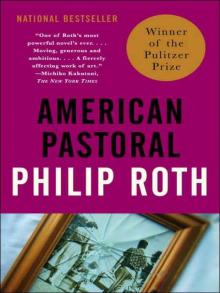 American Pastoral
American Pastoral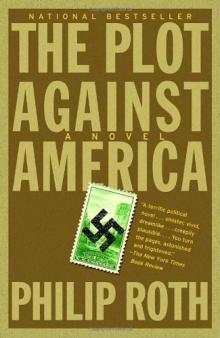 The plot against America
The plot against America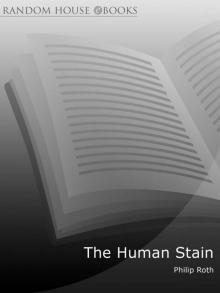 The Human Stain
The Human Stain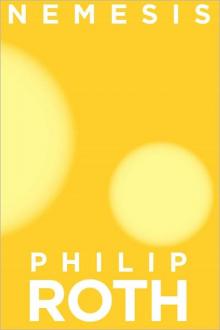 Nemesis n-4
Nemesis n-4 Sabbath’s Theater
Sabbath’s Theater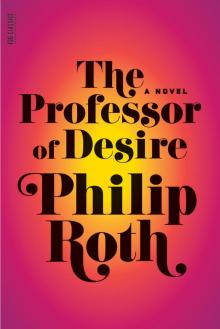 The Professor of Desire
The Professor of Desire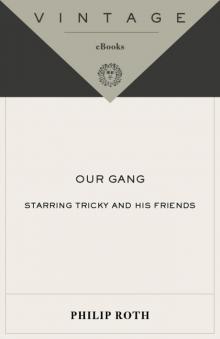 Our Gang
Our Gang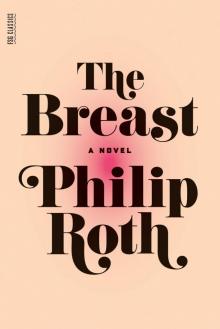 The Breast
The Breast Operation Shylock
Operation Shylock The Dying Animal
The Dying Animal Letting Go
Letting Go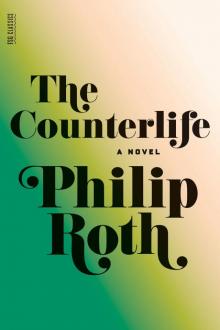 The Counterlife
The Counterlife Everyman
Everyman Nemesis
Nemesis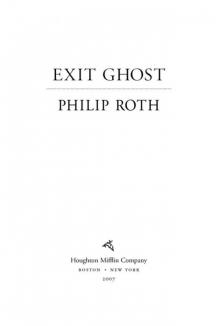 Exit Ghost
Exit Ghost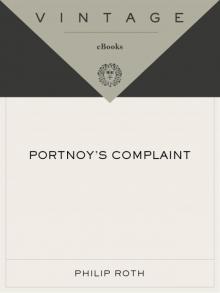 Portnoy's Complaint
Portnoy's Complaint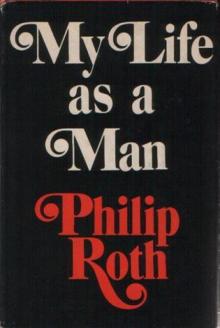 My Life as a Man
My Life as a Man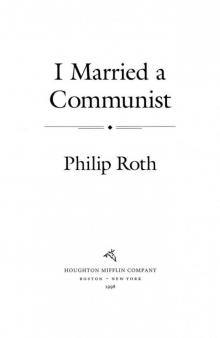 I Married a Communist
I Married a Communist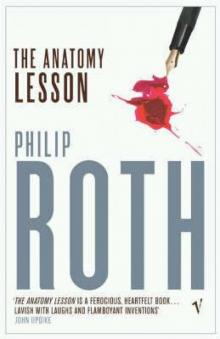 The Anatomy Lesson
The Anatomy Lesson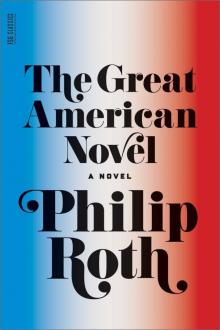 The Great American Novel
The Great American Novel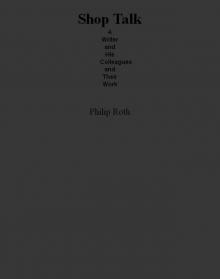 Shop Talk
Shop Talk The Humbling
The Humbling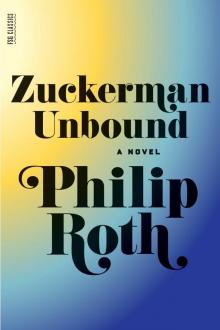 Zuckerman Unbound
Zuckerman Unbound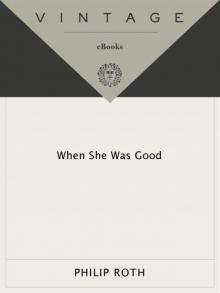 When She Was Good
When She Was Good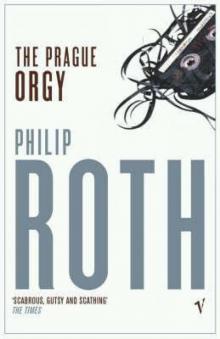 The Prague Orgy
The Prague Orgy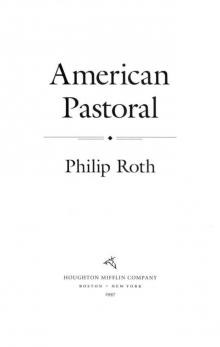 American Pastoral (Nathan Zuckerman)
American Pastoral (Nathan Zuckerman) Goodbye, Columbus
Goodbye, Columbus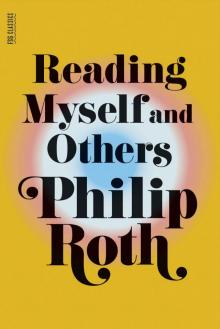 Reading Myself and Others
Reading Myself and Others